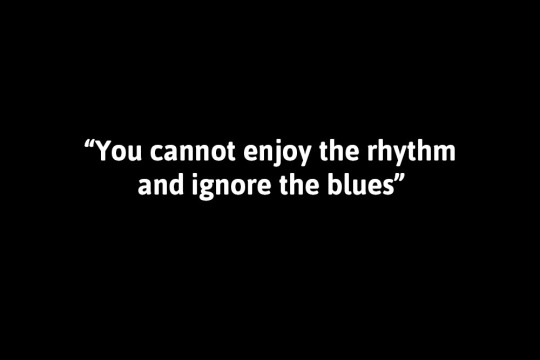Music Taught Me to Love My Blackness | A Letter From The Editor

By no means, has the music industry been kind to black voices or bodies. One needs to look no further than the history of Race Records, look at the makeup of a board room of music executives, or look at the ways we so readily accept terms blue-eyed soul and urban, the latter of which speaks to a period of white flight and increased urbanization.
Music marketing and consumption have largely sought to profit off the innovation and sorrow of black artists, largely at their expense. Indeed, it is difficult to find a popular genre today that does not owe its roots to the ingenuity and resilience of black creatives. Yet, this is not a historic issue. It is one that persists to this day. Far too often do we readily celebrate the musical contributions of black voices while all too happily turning a blind eye to their plight. As Amanda Seales puts it more eloquently than I could ever hope to, "You cannot enjoy the rhythm and ignore the blues."
As protesters take to the streets across the world and civil unrest reaches a boiling point in the United States, I want to take this moment as a black man and editor of this site to share my perspective.
I was afforded the opportunity attend a largely white and liberal charter school in Pacific Palisades, one of the most affluent neighborhoods in Los Angeles. Never mind the fact that my mom had to drive me there each morning or that I had to spend two hours each day taking two buses home, there was some sense among my immediate family that I had, in some sense, made it.
In being shoulder to shoulder with children of celebrities and affluence, I was quickly reminded me of something my mom often told me growing up. That it didn't matter how much I loved Salinger or Vonnegut, my penchant for obscure trivia, or my general kindness to strangers, I had to remember my blackness, how I would be immediately viewed by the world at the large. It was something I initially had difficulty grasping growing up, only taking on a nebulous shape in elementary and middle school when I was the only one of my friends followed around convenience stores or acquaintances would praise my curls as they ran their fingers through my hair.
Yet, my mother's warning, which I often saw as nothing more than a caregiver's proclivity to be overly worrisome, took on a more salient tone the older I grew. Throughout high school, I was called slurs by my friends, whether in jest or anger. I was the first one everyone's head would turn to when in history class we would reach the yearly discussion of slavery. I was asked day in and day out, "So, what are you?" A question whose response I learned like a script, providing a myriad of varying percentages and estimated makeups to explain away why I wasn't quite as dark or light as people expected.
I grew to become acutely aware of my blackness, a fact that only increased as I saw images and videos of people who looked like me being shot in the street, in their own homes. I wished to erase my blackness, to not stick out, to not have to fear being gunned down.
For some time, I subconsciously viewed my melanin as an unlucky roll of the dice. It was not until college that I realized how wrong I was. In those four years, I was formally introduced to the triumphs and celebrations of people who looked like me more than any point in my previous odd twelve years of schooling. In my history of African-American music class (one I recommend taking if you are ever given the opportunity), no longer was I relegated to a month out of the year or taught that racism was an unfortunate blip in American history.
I found myself pooling over the sorrowful yet prideful works of Nina Simone and Kendrick Lamar, tracing the lines from ragtime, blues, soul, R&B, to hip-hop. I celebrated the gospel origins of Kanye West's The Life of Pablo, a notion I would have to grapple with a few short years later. I found myself-electrically charged by Jamie xx's reimagining of Gil Scott-Heron's sonic memoir, I'm New Here. With each new album and story, I mourned the historical injustice of black innovators in popular music, a facet I would soon learn was no historical artifact, becoming entrenched in the music industry myself. Through music, I learned to love my blackness.
As people flood to the streets across the world expressing a very real and justified outrage, I thank all the wonderful teachers and friends who have introduced me to black activists, authors, innovators, leaders, and artists over the years. I thank all my Asian friends who have stood beside me in dismantling the model minority myth put in place by our oppressors. And I thank all my white friends who have listened, asked questions, donated, and protested alongside me.
What I wish for now is not to shy away from my blackness but to live in a world where, to this day, my mom doesn't have to warn me of how others may view my blackness. "You cannot enjoy the rhythm and ignore the blues."

